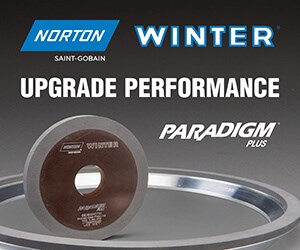The Privilege Of Adding Value Why work in machining?
Shop owners and managers occasionally address this question for young people thinking of entering the metalworking field. And from time to time, those owners and managers may ask themselves the same question.
Shop owners and managers occasionally address this question for young people thinking of entering the metalworking field. And from time to time, those owners and managers may ask themselves the same question. Machining often isn't lucrative and certainly isn't glamorous. Those who have found a home in this field are the ones who keep on rediscovering the rewards that set the machining business apart.
A shop owner struggling to build his own business recently described his feelings about the field. "It gets in your blood," he told me. Raised in a machining family, he left a professional career to start his own job shop. "You look at the finished part, you look at the numbers when the job is done, and you know right away whether you've done good work," he said.
This chance to do good work is central to machining's appeal. We do our jobs to earn a living, yes, but another reason people work is to satisfy a need to be useful. We all want to add something of value to the world. Work offers an opportunity to do this.
But not necessarily for everyone. In our complex and interconnected society, many people filling many jobs have a hard time determining how much good they do. In some fields, the end product is indeterminate, and an individual's role in any success is vague. Employees who do their jobs may still be left to wonder, in a larger context, just what their work contributes to the world.
Owners and employees of machine shops get to see their contributions more clearly. They make something. What's more, they make ideas real. Customers come to them with shapes existing only in drawings or CAD. The shop is asked not only to produce the part, but to find an efficient way to do so. Shops don't just make ideas real, in fact—they make ideas practical.
A different owner, while leading me through his shop, picked up a complex titanium workpiece full of intricate milled channels and said, "Now this is a beautiful part!"
I knew exactly what he meant. To machine the part efficiently enough for the shop to meet its costs and make a fair profit had been a challenge. The shop had risen to that challenge admirably. What was beautiful to the owner was the struggle and the success. And for evidence of that success, he didn't have to look any farther than the part he held in his hand.
Related Content
-
6 Steps to Take Before Creating a CNC Program
Any time saved by skipping preparation for programming can be easily lost when the program makes it to the machine. Follow these steps to ensure success.
-
Understanding Errors In Hand-Held Measuring Instruments
Different instruments (and different operators) are prone to different errors.
-
Understanding Swiss-Type Machining
Once seen as a specialty machine tool, the CNC Swiss-type is increasingly being used in shops that are full of more conventional CNC machines. For the newcomer to Swiss-type machining, here is what the learning curve is like.

.jpg;width=70;height=70;mode=crop)











